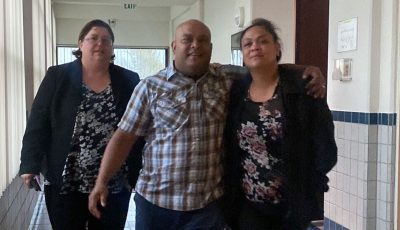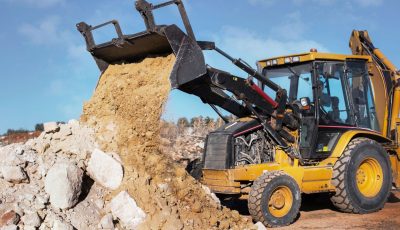NRCS assists in building runoff-adverse piggery projects on Saipan
The National Resources Conservation Service, under the U.S. Department of Agriculture, is “cost-sharing” several environmental friendly projects on island, some of which are designed to help prevent runoff pollution and deter water costs.

This “dry litter” piggery is designed to prevent the harmful effects of wash-down or “wet” piggeries, which carries stronger odor, flies, and contributes to the runoff pollution from the island’s watersheds. (Dennis B. Chan)
Contracted under EQIP, or the Environmental Friendly Incentives program, Saipan resident Joe Seman now has a rebar enforced, covered piggery with gutters draining rainwater into pipes and a water tank. The tank then feeds water into “nipples” in each pigpen for pigs to bump with their snout and drink.
The piggery is a “dry-litter” piggery, meaning it has piles of shredded wood chips in each pen, which over time collects the waste of Seman’s pigs.
This, versus a “wash-down” or wet piggery, which attracts more flies and contributes to the runoff waste that eventually enters the streams of the island’s watersheds and into the ocean.
Seman’s piggery is elevated at a 12-percent slope. This allows the piles of shredded wood and waste almost fall out of their pens, where they are scooped out and put into three compost bins built behind the piggery.
According to NRCS district conservationist Kendal B. Hicks, the waste is properly composted and takes about four months before they “smell like earth” and can put around Seman’s fruit trees on his property.
Seman told Saipan Tribune he thinks the piggery should last him at least 10 years. With his previous piggery, an open, wash-down or “wet” piggery, he had to change its pallet every year. Hicks also said the piggery structure can withstand 175 miles per hour of wind, as is standard to resist typhoons in the CNMI.
The idea of a sloping, dry litter, and composting piggery ties into a much bigger environmental idea. That is, how to prevent runoff pollution from entering the streams of island’s watershed and into the ocean surrounding the island’s beaches?
For one, the Bureau of Environmental and Coastal Quality has walked up the stream sites and visited houses in the Achugao or Tanapag watershed, looking for possible sources of pollution to the often “red-flagged” beaches nearby.
Through their water quality division, BECQ tries to get families, whose houses often sit right next to these streams, finds ways to clean up their pig waste, or to seal off their water wipes discharging into the stream, or move their animals off these streams.
Hicks and other NRCS administrators, along with a team from BECQ visited the home of Morhina and Francisco Iguel on Wednesday to present her with the designs for the new piggery.
Her previous piggery, which per her contract with EQIP has been broken down, sat right near a village stream.
Iguel’s new piggery, which is about to begin permitting clearances, will be the first NRCS-contracted piggery in Tanapag.
The Iguels will be the first family in the village to this, according to NRCS and BECQ. They will be an example of a home complying with water quality enforcement rules.
HickS told Saipan Tribune that the EQIP is a “cost-share” program, where “reimbursement is quick.” NRCS provides technical and design assistance and financial reimbursement for the costs of their projects, which are approved with operational and maintenance requirements. Participants can choose their won contractors, or select from a list of contractors NRCS provides. Contact Hicks at (670) 233-3415 ext. 100.



























